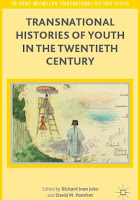 |
| Published by Chicago Univeristy Press |
Just at the time when the direction of travel is shifting away from allowing free movement across frontiers and towards the reimposition of hard borders, comes this book which tells us how it was the backpacking youth, travelling freely across Europe, that helped to reintegrate our societies, connect cultures. heal wounds and broaden horizons after the devastation of World War II. This story has, to my knowledge, never before been spotlighted.
Its author Richard Ivan Jobs, a backpacker himself in Europe and India in the 1990s, is now a history professor at Pacific University in Oregon. His penchant for travel has servcd him well, both then and now, because this book required conducting research in roughly forty archives, libraries and institutes in eight countries and five languages.
The book's fascinating story. which extends to the end of the Cold War and beyond, begins with large numbers of young people, students and volunteers, being funded to rebuild the remnants of a nascent youth hostel network and repair railways across the continent. Large mutinational gatherings of youth encouraged a new feeling of connectedness, a desire to dismantle borders and create a peaceful, harmonius united Europe.
In the 50s, the recovery process begins to take hold. The road and rail networks are repaired, there is a vast expansion of youth hostels and large numbers of hitchhikers become a common sight.
In the 60s, this existing youth travel movement intersects with the new counter-cultural and political youth trends, creating a powerful interconnected web of activity linking hip cities like London, Amsterdam and Berlin with the eastern bloc. A disastrous flood in Florence in 1966, which threatened and damaged treasured buildings, documents and works of art, triggered off a huge youth response. These so-called "mud angels" flocked to the city and worked tirelessly to rescue and clean-up the city. 1968 saw revolutionary activity across Europe. The youth also began travelling overland to Asia via Istanbul on what came to be known as the "hippy trail".
By the 70s, the Interail and Eurail schemes allowed the youth to travel widely and cheaply. An increasing influx of Americans came to Europe courtesy of a new breed of budget airlines and a new generation of guide books provided advice to the burgeoning tribes of travellers.
With the dramatic events leading up the fall of the Berlin Wall and the end of the Cold War, east and west travel expanded and by the 90s, youth travellers' focus extended to Latin America and South-East Asia in particular. The concept of a 'gap year' became established as a career move for your own personal development and future prospects. Now there's a new breed of digital travellers who use social media to organise their way ahead in a much more improvisational manner and who broadcast their adventures and pictures on the web.
There is a bigger message embedded in 'Backpack Ambassadors' - namely that the contribution of youth has been undervalued in our historic accounts. I discovered, during a 50-minute conversation with Jobs in Oregon via Skype, that two earlier works set the stage for his latest production.
First came 'Riding the New Wave: Youth and the Rejuvenation of France After the Second World War' [Stanford University Press 2007]. Yet to be read by The Generalist', the blurb whets the appetite:
This book tells the story of France's remarkable transformation in the 1940s and 1950s through exhaustive study of the role of youth and youth culture in France's rejuvenation and cultural reconstruction in the aftermath of war, occupation, and collaboration. Examining everything from Brigitte Bardot and New Wave film to Tarzan and comic books, from juvenile delinquents and managerial technocrats to soldiers and 1968 protesters, from popular culture to politics, the author makes a fascinating case for reconsidering the significance and meaning of youth in postwar France. Riding the New Wave advances a new methodological approach by considering age as a category of historical analysis comparable to, and in tandem with, race, class, and gender. This history reveals youth to be a central feature in France's recovery from the Second World War while also clarifying the international significance of youth in the tumultuous 1960s.'

Some years later, together with his colleague David Pomfret, he organised a workshop/conference in Hong Kong, attended by scholars from all over the world, which resulted in a multi-author book 'Transnational Histories of Youth in the Twentieth Century' [Palgrave Macmillan, 2015], that Jobs and Pomfret co-edited, about the hiustory of youth in a global context. It emphasised the need for a history of youth that, says Jobs, "thinks of young people as 'agents' and asks what are they doing and experiencing."
*
The idea of transnational histories of youth is an important one and Jobs' 'Backpack Ambassadors' is a valuable addition to the literature. In it Jobs highlights the fact that the 'Delphic priests of ancient Greece considered the right to come and go to be one of the four fundamental elements of freedom'. Jobs concludes:
'As internal border controls are introduced within Europe to stem the flow of migrants, refugees and security threats, it is ironic that while free mobility was used as a means to achieve stability and national security in the decades aftre the Second World War, it is now seen as a threat to those achievements. If rights of passage, the freedom of movement, were to be curtailed and the open borders closed, what effect this would have on European integration, already under stress, is unclear. Still, the transnational mobility of youth may remain an impetus for integration.'
*
No comments:
Post a Comment